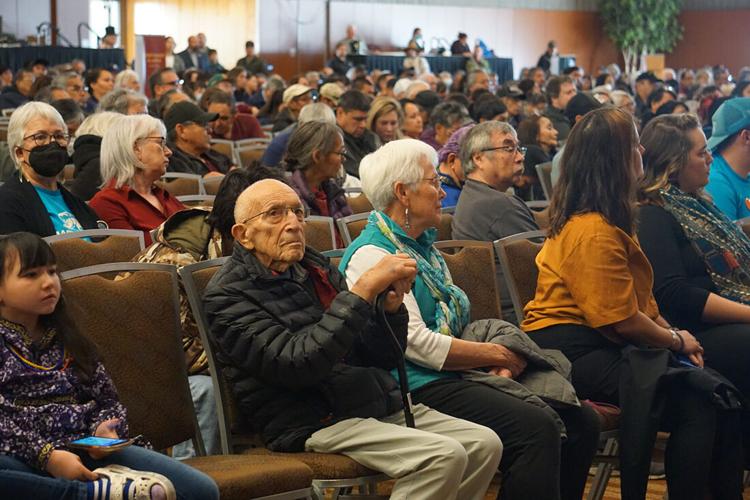Alaska education funding boost, sent to governor, awaits his veto
A bill that would increase Alaska’s K-12 education funding formula by $253 million per year is on the desk of Gov. Mike Dunleavy after both the House and Senate passed it.
Please log in, or sign up for a new account and purchase a subscription to continue reading.
We have used your information to see if you have a subscription with us, but did not find one. Please use the button below to verify an existing account or to purchase a new subscription.
Your current subscription does not provide access to this content. Please use the button below to manage your account.

Yereth Rosen/Alaska Beacon
Vic Fischer, the last surviving author of Alaska’s constitution, sits with wife Jane Angvik and listens to U.S. Senate candidates speak at the Oct. 22, 2022, forum at the Alaska Federation of Natives convention.
Alaska education funding boost, sent to governor, awaits his veto
A bill that would increase Alaska’s K-12 education funding formula by $253 million per year is on the desk of Gov. Mike Dunleavy after both the House and Senate passed it.
On Monday, a spokesperson for the governor said Dunleavy intends to veto it, confirming prior posts on social media.
The Alaska Legislature transmitted House Bill 69, containing the formula funding increase, to the governor on Saturday. Under the Alaska Constitution, the governor has until April 30 to sign it, veto it or allow it to become law without his signature.
If the governor vetoes the bill, lawmakers must meet “immediately” in joint session to vote and either confirm the governor’s veto or override it.
Overriding a veto on HB 69 would require 40 of the Legislature’s 60 members. Lawmakers for and against HB 69 have said they doubt there are enough votes to override a Dunleavy veto on the issue.
And even if the bill became law, actually funding the formula would require action in a separate budget appropriation bill. Overriding a budget veto would require 45 of 60 legislators.
Alaska House approves organized betting on snowfall amounts
Alaskans could soon have access to a new type of charitable gambling.
In a 35-2 vote on Friday, the Alaska House of Representatives voted to allow “snow classics,” a type of gambling game that involves guessing the amount of snow on the ground at a certain spot and a certain date and time.
Snow classics are currently limited to a guessing game at Mount Alyeska, held to benefit Four Valleys Community School, but if the Senate passes House Bill 50 and Gov. Mike Dunleavy allows it to become law, organizations across the state would be allowed to hold them.
HB50 was sponsored by Rep. Sara Hannan, D-Juneau, who introduced it on behalf of the Juneau Nordic Ski Club.
The tax division of the Alaska Department of Revenue said it believes the bill could be implemented without any impact on the state budget.
Alaska House votes to rename ocean park in honor of longtime political figure
Alaska lawmakers are planning to name a park in honor of one of the signers of the Alaska Constitution.
On Monday, the Alaska House of Representatives voted 37-3 to name Shoup Bay State Marine Park in honor of Victor Fischer, who was the last living signatory to the Alaska Constitution when he died in 2023 at age 99.
Shoup Bay is located 5 miles from Valdez, and if the Alaska Senate passes House Bill 79 and Gov. Mike Dunleavy allows it to become law, the park would become Vic Fischer Shoup Bay State Marine Park.
Fischer was active in state and local politics for decades, and as a member of the Alaska Legislature in 1983, sponsored the legislation that created Alaska’s first 13 state marine parks.
The Alaska Department of Natural Resources said that the name change could be done at no cost; the new name will be added to signs and other material during the ordinary schedule of replacement.
Alaska House reapproves another missed-deadline bill from last year
Last year, Gov. Mike Dunleavy vetoed five bills, citing the fact that the Alaska Legislature passed them after the constitutional end of the legislative session.
So far in 2025, four of those five bills have been reapproved by either the House or Senate.
On Friday, the Alaska House of Representatives voted 37-0 to remove a requirement that fishing vessels register with the state Department of Motor Vehicles if they’re already registered with the U.S. Coast Guard and Alaska Commercial Fisheries Entry Commission.
That removal will become law if the Senate and Gov. Mike Dunleavy also approve House Bill 31, which contains the removal and was the fourth of the five bills vetoed last year because of the missed deadline.
The bill was sponsored by Rep. Louise Stutes, R-Kodiak, in both years.
Of the remaining missed-deadline bills, the Legislature has already passed two: one that allows state borrowing for a cruise ship dock in Seward, and another that allows teens to serve alcohol at restaurants, lodges and similar establishments. Senate Bill 15 is awaiting the governor’s action.
The Senate — but not the House — has passed a bill allowing employers to pay employees via “payroll cards.”
The last of the vetoed-and-reintroduced bills, which would have banned insurance companies from denying coverage or charging higher rates to elected officials, has not received a hearing.
Alaska Beacon is part of States Newsroom, a nonprofit news network supported by grants and a coalition of donors as a 501c(3) public charity. Alaska Beacon maintains editorial independence. Contact Editor Andrew Kitchenman for questions: info@alaskabeacon.com.